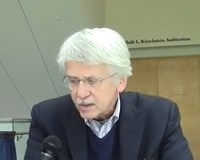User login
BETHESDA, MD. – Alzheimer’s disease is not the failure of a single type of cell – or even a single physiologic system, so while the search for effective treatments goes on, basic research must continue to unravel many of its fundamental mechanisms, according to Dr. Ronald Petersen, director of the Mayo Clinic Alzheimer’s Disease Research Center in Rochester, Minn.
But in lieu of available treatments that target the underlying pathology of Alzheimer’s, trials must continue to test lifestyle interventions with diet and exercise that in preliminary studies have started proving their worth in decreasing the risk of cognitive decline or delaying its onset.
Dr. Petersen discussed these issues in an interview at the Alzheimer’s Disease–Related Dementias 2016 Summit, sponsored by the National Institutes of Health.
The video associated with this article is no longer available on this site. Please view all of our videos on the MDedge YouTube channel
On Twitter @alz_gal
BETHESDA, MD. – Alzheimer’s disease is not the failure of a single type of cell – or even a single physiologic system, so while the search for effective treatments goes on, basic research must continue to unravel many of its fundamental mechanisms, according to Dr. Ronald Petersen, director of the Mayo Clinic Alzheimer’s Disease Research Center in Rochester, Minn.
But in lieu of available treatments that target the underlying pathology of Alzheimer’s, trials must continue to test lifestyle interventions with diet and exercise that in preliminary studies have started proving their worth in decreasing the risk of cognitive decline or delaying its onset.
Dr. Petersen discussed these issues in an interview at the Alzheimer’s Disease–Related Dementias 2016 Summit, sponsored by the National Institutes of Health.
The video associated with this article is no longer available on this site. Please view all of our videos on the MDedge YouTube channel
On Twitter @alz_gal
BETHESDA, MD. – Alzheimer’s disease is not the failure of a single type of cell – or even a single physiologic system, so while the search for effective treatments goes on, basic research must continue to unravel many of its fundamental mechanisms, according to Dr. Ronald Petersen, director of the Mayo Clinic Alzheimer’s Disease Research Center in Rochester, Minn.
But in lieu of available treatments that target the underlying pathology of Alzheimer’s, trials must continue to test lifestyle interventions with diet and exercise that in preliminary studies have started proving their worth in decreasing the risk of cognitive decline or delaying its onset.
Dr. Petersen discussed these issues in an interview at the Alzheimer’s Disease–Related Dementias 2016 Summit, sponsored by the National Institutes of Health.
The video associated with this article is no longer available on this site. Please view all of our videos on the MDedge YouTube channel
On Twitter @alz_gal
EXPERT ANALYSIS FROM THE ADRD SUMMIT 2016
